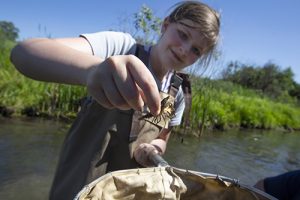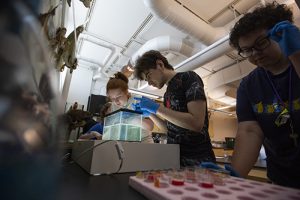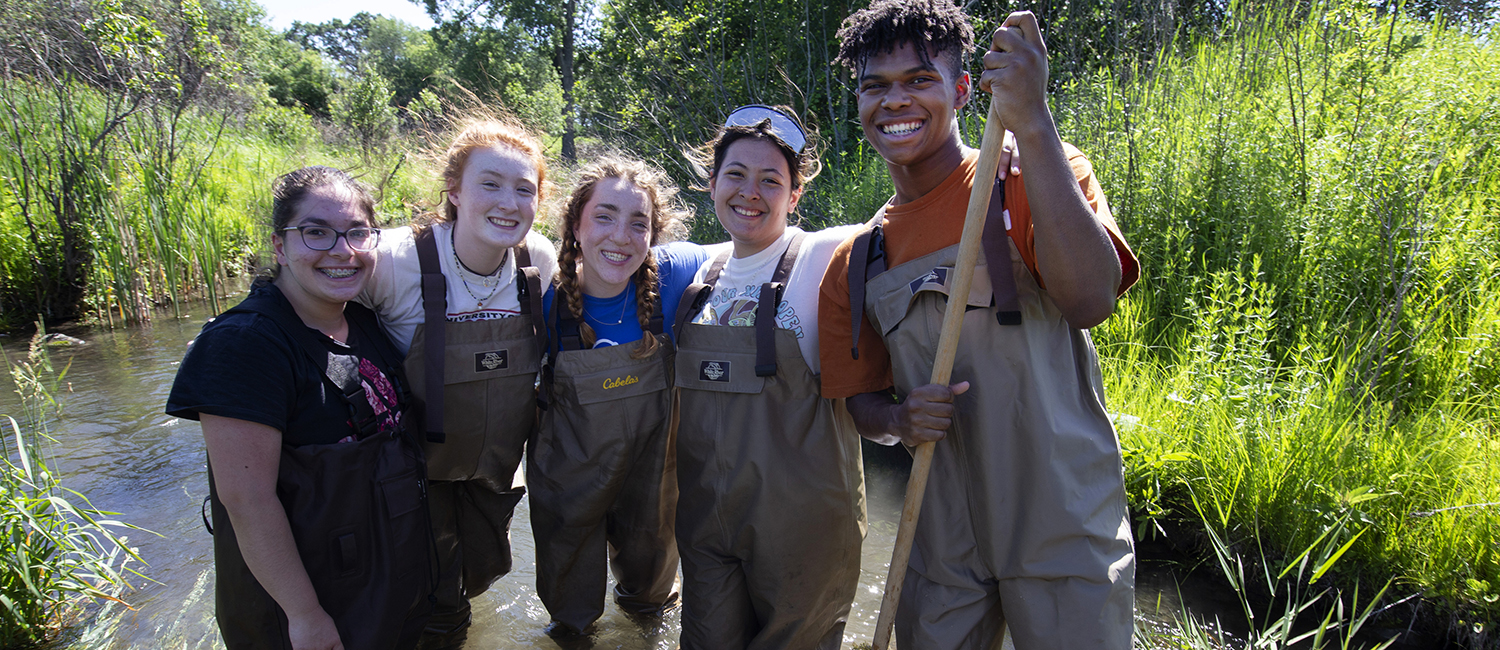As the school year cooled down, Freshwater Camp at UW-Parkside and UW-Whitewater was heating up. High school juniors and seniors from Wisconsin and northern Illinois took part in a week-long exploration of freshwater careers while enjoying recreational opportunities that Wisconsin’s waterways provide.
“Freshwater Camp provided the opportunity for students to visit a variety of freshwater habitats, gain hands-on experience paddling, use a variety of equipment to sample aquatic macroinvertebrates, fish and water quality parameters, and to meet with professionals who work in water-related careers,” says Elisabeth Harrahy, an associate professor at UW-Whitewater who designed the course with Jessica Orlofske, an associate professor at UW-Parkside.
Many students in southeastern Wisconsin high schools, particularly those from underserved communities, aren’t aware of the vast array of options available to them to study and to obtain a career in a water-related field. One of the camp’s goals was to raise awareness and provide access to students who may not have the means to participate in this kind of experience. Funding from the Freshwater Collaborative of Wisconsin gave 18 high school students the opportunity to attend the camp and provided free dormitory housing, meals and transportation throughout their stay.
After dropping off their gear in the UW-Parkside dorms Monday morning, the students headed for the Root River Environmental Education Community Center for kayaking and water testing. After lunch, the campers learned about water quality testing before heading back to campus.
“This was my first time kayaking and I really enjoyed that. I am excited to be able to learn in an outdoors environment,” says Adam Turner, a student from Whitefish Bay High School, who echoed the sentiments of many of his fellow campers.
While some of the students came to the camp for a bit of fun, other campers like Hayley Tench from Harborside Academy in Kenosha attended the camp with specific reasons in mind.

“I wanted to come to Freshwater Camp because I want to go into environmental conservation, and I believe a background in wildlife and fisheries would be a good thing to have and I thought it would be a fun thing to do for the summer,” she says. Hayley’s future plans fit perfectly with the objectives of the free camp.
Day two included fish and invertebrate sampling on the Pike River in the morning, which was of particular interest to Numa Khan, a recent graduate of Warren Township High School.
“I attended the camp because I thought it would be fun and I already took an environmental science course and enjoyed it, so I wanted to continue learning about it. I am most excited to learn more about fish and invertebrates,” she says. For Hayley, it was learning about electrofishing that is used to capture fish for sampling and doing counts.
In the afternoon, it was off to the lab to learn about macroinvertebrates with camp directors Orlofske and Harrahy. Students also learned about water chemistry.
“Throughout the camp, students became comfortable working in waders, learned to identify several types of aquatic invertebrates used for routine regulatory monitoring; performed basic water analysis; and discussed the importance of experimental controls, randomization and protocol standardization,” Orlofske says. “Many of these skills apply to all areas and fields of science, but are especially important for studies of our freshwater ecosystems.”
On Wednesday, the campers toured Samuel Myers Park and North Beach Park in Racine before heading to UW-Whitewater for the second half of the camp.

Thursday morning found the Freshwater Camp students setting up an aquatic toxicity test to determine the effects of caffeine on survival of water fleas. They then visited Whitewater Lake in the Kettle Moraine State Forest where they discussed the importance of shoreland restoration, collected phytoplankton and zooplankton samples using Kemmerer samplers and plankton nets, and measured water quality parameters using test strips, meters and a Secchi disk.
In the afternoon, they visited Bluff Creek State Natural Area where they collected aquatic macroinvertebrates using nets and a Hess sampler, measured current velocity and various water quality parameters, and learned how to apply the Citizen Monitoring Biotic Index to assess the health of the stream. After dinner, they played video games, air hockey and table tennis or bowled at Warhawk Alley in the UW-Whitewater Student Center.
On Friday, the students visited Beulah Bog State Natural Area where they hiked into the bog, learned about this unique type of wetland, and observed three different types of carnivorous plants. In the afternoon, they spent some time in the laboratory breaking down their toxicity test and examining their plankton and macroinvertebrate samples before heading home.
“We hope to have opened these students’ eyes to the importance of protecting our many water resources, the possibility of pursuing a career in a water-related field and what the UW system campuses have to offer in these areas,” Harrahy says. “Above all, we hope the students had a great time and enjoyed interacting with each other.”
This article was co-written by Laura Mason, UW-Parkside, and Heidi Jeter, Freshwater Collaborative of Wisconsin.

